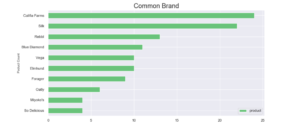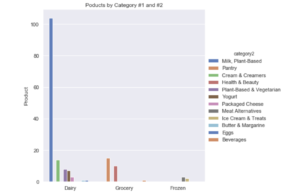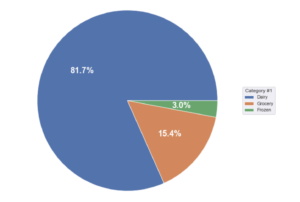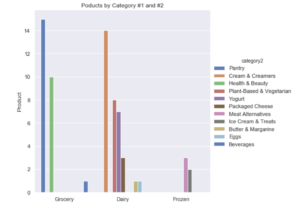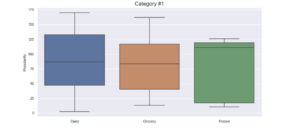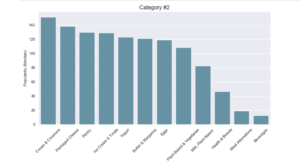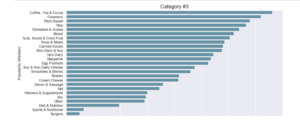Plant-Based Products: Popularity on the Online Grocery Website
Posted by Kisaki Watanabe
Updated: Feb 9, 2020
 Project Summary
Project Summary
The project's goal was to understand the larger picture of plant-based product market.
My main interest came from the news headlines we frequently encounter these days that meat alternatives and other bio-engineered alternatives are on the rise (30% growth of sales from 2018) and that large fast-food chains such as Burger King offer meat-less burgers at the stores now. Originally, I wanted to understand the reasons why people buy those products - such as for health reasons (diabetes, etc.) or for personal reasons. Yet due to lack of reviews on the website that was available to web-scrape, I limited the scope and focused more to understand the plant-based product market from the wholesaler perspective.
Web-scraped website
I web-scraped the website of grocery supermarket called "Freshdirect.com".
It markets itself as kosher, gluten-free, and organic, and caters towards consumers who buy into those items, which I thought would be a good place to start to analyze the market trend for those who choose to buy vegetarian or vegan items.
Exploratory Data Analysis
First, I checked top brands (by product count) and interestingly most of brands were from dairy category. So, I created a bar chart by large category types and small category types.
These clearly displayed that 80% of plant-based items are dairy products and inside these items, alternative milk covered the shelf most.
The pie chart explains better:
Even after I remove the outlier plant-based milk category from the chart, pantry (bulk milk items) and other dairy (cream, cheese, yogurt, etc.) were high up.
Now shifting the gear towards more about the popularity rather than the sheer count, the boxplot by major category type (dairy, grocery, and frozen) showed interesting results. Frozen category had the highest median popularity score, although it had the smallest share in the variety.
If you drill down into smaller category type, interestingly, plant-based milk product popularity was not that high, compared with the product coverage. See below:
On the other hand, cream, creamers, cheese, ice cream, and yogurt were very popular - although dairy alternatives in general are pretty sought out, the popularity is pretty divided inside them. It is worth it to mention that meat alternatives ranked really low for both product coverage and popularity.
Chart with even further detailed category:
Conclusion and Next Step
From both popularity and product count perspectives, meat alternatives have not still reached their highest potential yet despite of all the heat in the news.
If you are a new seller in the food industry - especially in the vegan/vegetarian market, there is still a lot of room to learn from or probably wiggle in the dairy section such as alternative milk, creamers, cheese, yogurt, ice cream etc. Ice cream market is quite small, yet very popular, which could open up a lot of doors if somebody wants to step into the industry.
It should be noted that since the "popularity" ranking was defined by the Freshdirect and no reviews are provided on the website, the next step would be to explore websites with customer reviews and understand why some products are more popular than others - how factors such as price or taste boost or limit the sales - would be the next question to be asked for this data analysis project.
You can find details here on the Github.
Apply for the Upcoming NYC Data Science Bootcamp
The first step in becoming a data scientist is to complete your Data Science Bootcamp Application. Just click the button to apply. It's free and will only take you about 5 minutes.
Kisaki Watanabe
Data Scientist with strong consulting experiences in data analytics/visualization and risk management, serving for industries ranging from social networking service, game, pharmaceutical, media, and advertising. Advanced skills in fraud investigation and trend projection/analysis with tools such as Tableau, Alteryx, and Qlikview. Trained and certified for data science - programming languages (R and Python), statistics, and machine learning.
View all articlesTopics from this blog: Web Scraping Alumni Meetup Community Student Works Data Science News and Sharing
Subscribe Here
Posts by Tag
- Meetup (101)
- data science (68)
- Community (60)
- R (48)
- Alumni (46)
- NYC (43)
- Data Science News and Sharing (41)
- nyc data science academy (38)
- python (32)
- alumni story (28)
- data (28)
- Featured (14)
- Machine Learning (14)
- data science bootcamp (14)
- Big Data (13)
- NYC Open Data (12)
- statistics (11)
- visualization (11)
- Hadoop (10)
- hiring partner events (10)
- D3.js (9)
- Data Scientist (9)
- NYCDSA (8)
- Web Scraping (8)
- Career (7)
- Data Scientist Jobs (6)
- Data Visualization (6)
- Hiring (6)
- Open Data (6)
- R Workshop (6)
- APIs (5)
- Alumni Spotlight (5)
- Best Bootcamp (5)
- Best Data Science 2019 (5)
- Best Data Science Bootcamp (5)
- Data Science Academy (5)
- Demo Day (5)
- Job Placement (5)
- NYCDSA Alumni (5)
- Tableau (5)
- alumni interview (5)
- API (4)
- Career Education (4)
- Deep Learning (4)
- Get Hired (4)
- Kaggle (4)
- NYC Data Science (4)
- Networking (4)
- Student Works (4)
- employer networking (4)
- prediction (4)
- Data Analyst (3)
- Job (3)
- Maps (3)
- New Courses (3)
- Python Workshop (3)
- R Shiny (3)
- Shiny (3)
- Top Data Science Bootcamp (3)
- bootcamp (3)
- recommendation (3)
- 2019 (2)
- Alumnus (2)
- Book-Signing (2)
- Bootcamp Alumni (2)
- Bootcamp Prep (2)
- Capstone (2)
- Career Day (2)
- Data Science Reviews (2)
- Data science jobs (2)
- Discount (2)
- Events (2)
- Full Stack Data Scientist (2)
- Hiring Partners (2)
- Industry Experts (2)
- Jobs (2)
- Online Bootcamp (2)
- Spark (2)
- Testimonial (2)
- citibike (2)
- clustering (2)
- jp morgan chase (2)
- pandas (2)
- python machine learning (2)
- remote data science bootcamp (2)
- #trainwithnycdsa (1)
- ACCET (1)
- AWS (1)
- Accreditation (1)
- Alex Baransky (1)
- Alumni Reviews (1)
- Application (1)
- Best Data Science Bootcamp 2020 (1)
- Best Data Science Bootcamp 2021 (1)
- Best Ranked (1)
- Book Launch (1)
- Bundles (1)
- California (1)
- Cancer Research (1)
- Coding (1)
- Complete Guide To Become A Data Scientist (1)
- Course Demo (1)
- Course Report (1)
- Finance (1)
- Financial Data Science (1)
- First Step to Become Data Scientist (1)
- How To Learn Data Science From Scratch (1)
- Instructor Interview (1)
- Jon Krohn (1)
- Lead Data Scienctist (1)
- Lead Data Scientist (1)
- Medical Research (1)
- Meet the team (1)
- Neural networks (1)
- Online (1)
- Part-time (1)
- Portfolio Development (1)
- Prework (1)
- Programming (1)
- PwC (1)
- R Programming (1)
- R language (1)
- Ranking (1)
- Remote (1)
- Selenium (1)
- Skills Needed (1)
- Special (1)
- Special Summer (1)
- Sports (1)
- Student Interview (1)
- Student Showcase (1)
- Switchup (1)
- TensorFlow (1)
- Weekend Course (1)
- What to expect (1)
- artist (1)
- bootcamp experience (1)
- data scientist career (1)
- dplyr (1)
- interview (1)
- linear regression (1)
- nlp (1)
- painter (1)
- python web scraping (1)
- python webscraping (1)
- regression (1)
- team (1)
- twitter (1)
